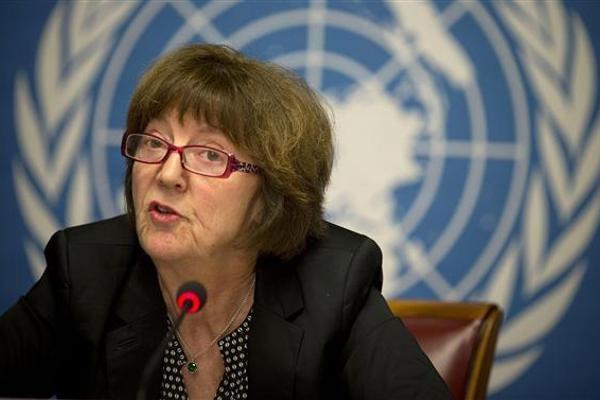UN watchdog slams Vatican's child abuse record
GENEVA - Agence France-Presse


Kirsten Sandberg, chairperson of the U.N. human rights committee on the rights of the child, talks during a press conference at the United Nations headquarters in Geneva, Switzerland, Wednesday, Feb. 5, 2014. AP Photo
The Vatican was denounced in a devastating report Wednesday for failing to stamp out child abuse and called on the Church to remove all clergy suspected of raping or molesting children.The UN Committee on the Rights of the Child said "tens of thousands of children worldwide" had been abused systemically for years within the Catholic church.
It urged the Holy See to "immediately remove all known and suspected child sexual abusers from assignment and refer the matter to the relevant law enforcement authorities for investigation and prosecution purposes".
In a hard-hitting report, the committee said the Roman Catholic Church was falling far short of its stated committment to stem abuse by priests and lay employees, including in schools.
"The Committee is gravely concerned that the Holy See has not acknowledged the extent of the crimes committed, has not taken the necessary measures to address cases of child sexual abuse and to protect children, and has adopted policies and practices which have led to the continuation of the abuse by and the impunity of the perpetrators," it added.
It blasted the practice of transferring abusers to different parishes within countries, and even across borders, in an attempt to cover up their crimes and remove them from the clutches of justice.
"Offenders' mobility, which has allowed many priests to remain in contact with children and to continue to abuse them, still places children in many countries at high risk of sexual abuse, as dozens of child sexual offenders are reported to be still in contact with children," it said.
The report followed a landmark hearing last month during which members of the committee -- made up of 18 independent human rights experts from around the globe -- grilled senior Churchmen and repeatedly questioned the Vatican's resolve.
Like other signatories of the 1989 UN Convention on the Rights of the Child, the Vatican agrees to be scrutinised by the panel.
It appeared before the committee in 1995, but that was prior to the abuse issue bursting into the spotlight.
Since 2001, Church abuse cases from around the globe have been dealt with internally by the Congregation for the Doctrine of the Faith -- the Vatican's justice department.
The committee complained that it had failed to receive data on all cases of child sexual abuse handled by the congregation or the resulting punishments.
It criticised the Church for dealing with the abuse behind closed doors, allowing "the vast majority of abusers and almost all those who concealed child sexual abuse to escape judicial proceedings in states where abuses were committed".
It also denounced the "code of silence" imposed on clergy under threat of excommunication, saying that it meant that cases of abuse where hardly ever reported to national law enforcement authorities.
Church whistleblowers had been "ostracised, demoted and fired", while priests who remained silent were even congratulated, and victims who were compensated bound by confidentiality clauses.
Benedict XVI, pontiff from 2005 to 2013, was the first pope to apologise to abuse victims and call for zero tolerance, though critics said rhetoric outstripped real action.
His successor Pope Francis has said Catholics should feel "shame" for abuse and in December created a commission to investigate sex crimes, enforce prevention and care for victims.
The UN committee welcomed that, but said it did not go far enough and that it was time for the Holy See to create an independent human rights mechanism to address abuse.
Referring to Ireland's "Magdalene Laundries" -- Church-run institutions for unmarried girls who got pregnant, finally closed in 1996 -- the committee said the Vatican had failed to provide justice despite "slavery like" conditions, degrading treatment, violence and sexual abuse.
It also said Church archives should be opened in order to hold accountable abusers and all those who concealed their crimes and knowingly placed offenders in contact with children.
The UN committee's recommendations are non-binding. The Vatican is expected to make a statement in response later Wednesday.
